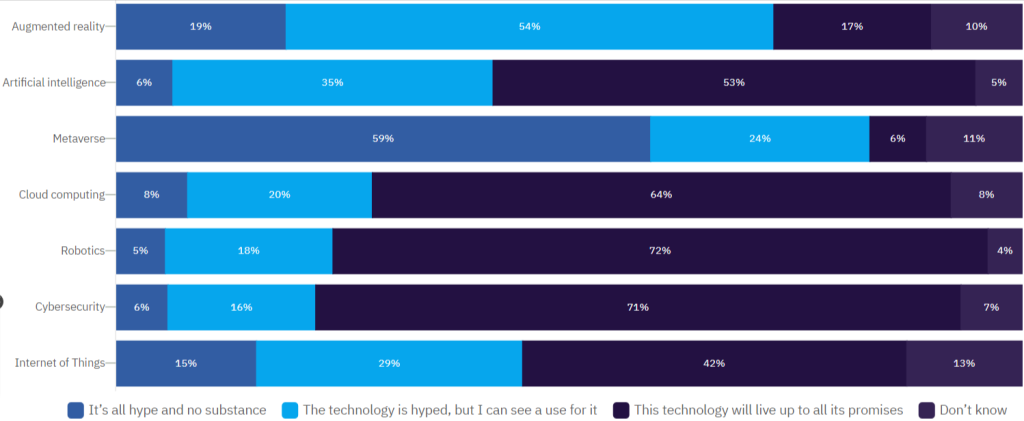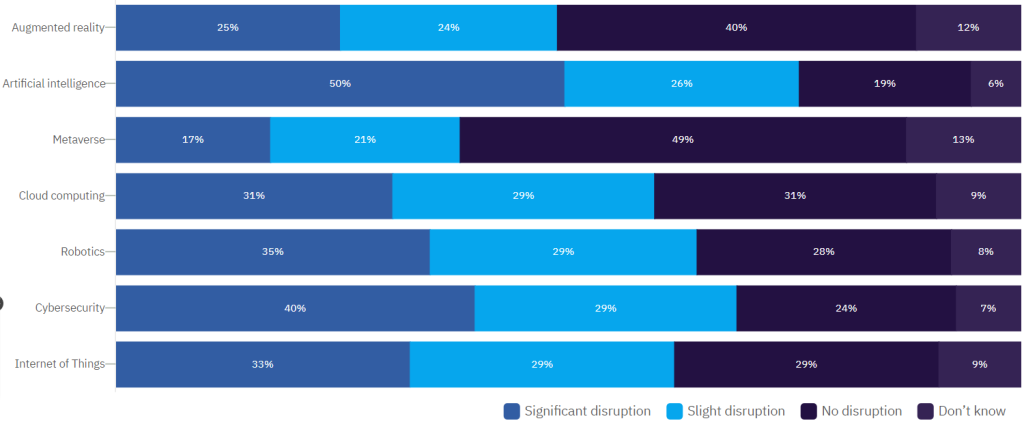
The metaverse is overwhelmingly the emerging technology among a group of seven of the most significant that is most viewed as being all hype and no substance, a recent GlobalData survey has found.
The Thematic Intelligence: Tech Sentiment Polls Q3 2023 survey looked variously at the measure of tech disruption, the disruption timeline, the perception of technology hype and substance and the change in sentiment to technologies over the third quarter of this year.

Nearly two-thirds (59%) of 368 respondents polled across the Verdict network of 30+ business-to-business (B2B) websites reported that they viewed the metaverse – the umbrella term for online 3D virtual words – as all hype. The next nearest technology on the measure at just 19% was augmented reality (AR), via which digital content is overlayed onto the real world.
The other technologies covered by the poll were the internet of things (15%), cloud computing (8%), artificial intelligence (6%), cybersecurity (6%) and robotics (5%).
Of the seven, the technology most widely expected to live up to all of its promises was robotics, with just shy of three-quarters of respondents (72%) taking that view. It was followed closely by cybersecurity (71%) and cloud computing (64%).

The technology viewed as most likely to disrupt respondents’ industries was artificial intelligence, with 50% of responses among 363 polled. Cybersecurity followed with 40%.

US Tariffs are shifting - will you react or anticipate?
Don’t let policy changes catch you off guard. Stay proactive with real-time data and expert analysis.
By GlobalDataOnce again, however, the technology viewed as most likely to deliver no disruption to respondents’ industries was the metaverse, with 49% of responses to that effect.
Such misgivings about the metaverse were also reflected in GlobalData’s recent Thematic Intelligence: The Metaverse in Media report. It suggests that investment in the sector is slowing as companies realise the immaturity of the underlying technologies and lack of meaningful use cases.
These prevailing views of the metaverse go against deal activity, patent filings and company filing mentions for the technology, all of which have seen consistent year-on-year growth, GlobalData analytics show.
Of the reasons for this, GlobalData Senior Analyst Anisha Bhatia commented: “No one has a concrete idea of what the metaverse actually is. It was a vague futuristic notion of Web 3.0 and a concept at best. There was also a marked difference between numbers quoted by industry agencies versus real user engagement and revenues.
“The development of the metaverse was never going to be an overnight thing. It would take years if not a couple of decades to see the vision that Mark Zuckerberg had come to fruition.
“There are many reasons why the hype has died down, one of the most important being that the technology to bring it all together simply doesn’t exist currently, not in terms of hardware, not in terms of software, not in terms of the networks that could power it.”



